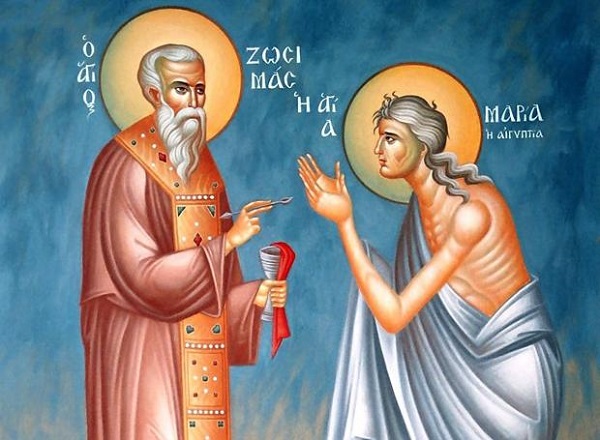Saint Mary the Egyptian (5th Sunday in Lent)
2 April 2023The 5th Sunday in Great Lent, the Sunday which is the week of great vigils, and ascetic struggles, the week of lamentations and sighs, is also the Sunday of the greatest among the women saints, our holy mother Mary the Egyptian.
She spent forty-seven years in the desert and the Lord gave her something which He gives only rarely to one of the saints. For years on end, she tasted neither bread nor water. When she was asked about this by Abba Zosimas, she answered: ‘We do not live by bread alone’ (Matth. 4, 4). The Lord fed her in a particular way and introduced her to the life of a hermit, to the struggles of an ascetic. And the result? The saint transformed her hell into paradise!

She overcame the devil and ascended to God on high. How? Through what? Through prayer and fasting, through prayer and fasting. Because fasting, fasting combined with prayer, is a power that overcomes everything. One wonderful hymn from Great Lent says: “Let us follow the Savior of our souls, Who has shown us victory over the devil through fasting’*. There’s no other weapon, no other means. Fasting! This is the way to defeat the devil, every devil. An example of this victory is Saint Mary the Egyptian.
What divine power fasting is! It’s nothing less than crucifying the body, crucifying your very self. As long as there’s a cross, victory is assured. The body of Mary, a former harlot from Alexandria, surrendered to enslavement to the devil. But when she embraced the Cross of Christ, when she took this weapon into her hands, she overcame the devil.
Fasting is the resurrection of the soul from the dead. Fasting and prayer open our eyes so that we see and understand our true self, as we really are. We then realize that every sin in our soul is our grave, our tomb, our death. We understand that sin within our soul does nothing other than turn everything that belongs to our soul into corpses: our thoughts, our feelings, our intentions. They’re a succession of graves. And then the cry of lamentation pours out from the soul: ‘Before I am lost at the end, save me’.
This is our cry during this holy week: ‘Lord, before I’m lost completely, save me’. This is how we prayed to the Lord during 5th week. We cried aloud in prayers given to us in the Great Canon by our holy father Saint Andrew of Crete.’ Lord, before I am lost at the end, save me’. This cry affects all of us, all those who carry sins. And who doesn’t?
It’s impossible to examine yourself and not find somewhere, in some corner of your soul, in some cranny, a sin that perhaps you’ve forgotten. Every sin you haven’t repented over is your grave, your death. And if you want to be saved and to raise yourself from your tomb, cry out in the prayers of lamentation of Great Lent: ‘Lord, before I am lost at the end, save me’. Let’s not fool ourselves; let’s not be deceived. If there’s even one sin left in your soul that you haven’t repented over, that sin will bring you into the kingdom of hell. There’s no place for sin in the kingdom of heaven.
If you want to gain the kingdom of heaven, take care to cast off all sin. Root out all sin through repentance. Because nothing escapes our repentance. Christ gave such power to holy repentance. Look. Since repentance was able to save such a promiscuous woman as Saint Mary the Egyptian once was, how can it not save other sinners, every sinner, even the greatest sinner and criminal? Yes, Great Lent is the battle-ground where, through prayer and fasting, we Christians defeat the devil, overcome all sins, conquer the passions and guarantee immortality and eternal life for ourselves.
In the lives of the saints and true Christians there are innumerable examples that show us that it really is only through prayer and fasting that we Christians can overcome the demons, all those who torment us and want to drag us down into the kingdom of evil, of hell. Ah, this holy fast! It’s the fast of our holy virtues. Every holy virtue raises your soul and mine from the dead.






